2013 – The Anglicans to Watch
As promised, here’s my top ten Anglicans who I believe will have an impact on the church in 2013 (and beyond). For some it may be for things that will happen over the next twelve months that will involve them, for others it’s about their ongoing “rise”.
Bubbling Under
Before we start the top ten, it’s just worth mentioning a few names I considered but didn’t include in the final list
- Vicky Beeching – Vicky is fast making a name for herself on the media circuit engaging with questions around the Church and Technology / Social Media and also generic theological issues. A highly successful recording artist, she is now studying part time for a PhD as well as pursuing a number of different commercial opportunities from her new base in London.
- Rt Revd Christopher Cocksworth – The Bishop of Coventry has just been appointed to the committee trying to sort out the mess over women bishops, is already the Chair of the Faith and Order Commission of General Synod (the Church of England’s milder version of the Inquisition) and was rumoured to be one of the short-listed names for Canterbury. As the youngest Diocesan he has plenty of time to slowly prepare the ground for next time round and being part of such important committees can’t but help…
- Revd Philip North – nominated for the Suffragan position in Whitby and then withdrawing after local opposition, Father Philip is one of the leading lights of a new generation of traditionalist anglo-catholic priests. Articulate and well liked, he will very likely get the Bishopric he deserves sooner rather than later.
- Rt Revd Martin Warner – The new Bishop of Chichester is the leading flag bearer for Forward in Faith in the country. He has inherited a Diocese riven by division and reeling from a number of scandals over child abuse, but it is the measure of the man that he was chosen to sort out that mess.
- Revd Frog Orr-Ewing – Just watch this video to understand why!
Right then, let’s get into the list. Remember, these are the top ten people who I think will shape the Church of England in 2013, either by their direct actions or simply their presence.
Number 10 – Revd Arun Arora
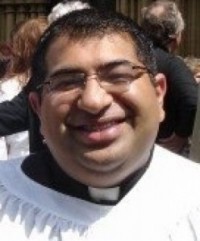 Deep in the bowels of Church House dwells a small team of people who have an unenviable task for employees of the Established Church – they have to communicate what the Church is or isn’t thinking to the general public and the beasts of Fleet Street. Heading up that team is the recently appointed new Director of Communications, the Revd Arun Arora.
Deep in the bowels of Church House dwells a small team of people who have an unenviable task for employees of the Established Church – they have to communicate what the Church is or isn’t thinking to the general public and the beasts of Fleet Street. Heading up that team is the recently appointed new Director of Communications, the Revd Arun Arora.
Before ordination Arun was the press officer for John Sentamu in Birmingham Diocese and he has an established track record in impressive public relations work. Already he is having a major impact in the Church of England with publicly issued daily press briefings and a slow but sure revamp of the use of social media. The impression from journalists working for the main newspapers is that Arun has brought a new level of professionalism and interaction between the media and the Church in the few months he’s been in place, and 2013 will continue to cement the position of Arun at the heart of shaping the public image of the Church of England.
Number 9 – Revd Sally Hitchiner
 Who else could get away with a photo-shoot in the Sunday Times entitled “The Vicar Wears Prada”? Who else could then get lynched in print by the Daily Mail in the days following, triggering a massive twitter campaign in support of her?
Who else could get away with a photo-shoot in the Sunday Times entitled “The Vicar Wears Prada”? Who else could then get lynched in print by the Daily Mail in the days following, triggering a massive twitter campaign in support of her?
Sally Hitchiner found herself in the public spotlight back in the summer of 2011 when her parish (she was serving as Curate) in Ealing was at the centre of the riots. Appearing on Sky News in the aftermath, the media latched onto this intelligent, witty and atypical young priest who was literally the face of a new generation of clergy who didn’t seem to go to bed wearing a dog collar and underwear from Wippel’s.
In 2012 she came back into the public perception with her presence around the Women Bishops’ vote, appearing as a very capable spokesperson on BBC Breakfast TV amongst other places. She is a favourite guest on the James Whale Show on LBC 97.3 and her profile piece in the Sunday Times magazine was met with approval across most of the Church of England. She has been approached to host a number of documentaries and it’s almost a certainty that we will see much more of her on our TV screens this year even when no-one is talking about any of the issues that brought her to prominence.
Number 8 – Revd Simon Rundell
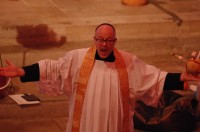 Simon Rundell recently moved to Exeter Diocese after several years in Portsmouth. He is most famous for his Blessed alternative worship services in the Liberal Catholic Tradition. He has written two book on using modern worship with children and general church environments (with a new book being published in January on evangelism with teens), sits on Fresh Expressions Round Tables, provides highly regarded alternative worship sessions at the Greenbelt festival and has recently been appointed a Church of England Selector.
Simon Rundell recently moved to Exeter Diocese after several years in Portsmouth. He is most famous for his Blessed alternative worship services in the Liberal Catholic Tradition. He has written two book on using modern worship with children and general church environments (with a new book being published in January on evangelism with teens), sits on Fresh Expressions Round Tables, provides highly regarded alternative worship sessions at the Greenbelt festival and has recently been appointed a Church of England Selector.
Although he’s only just settled into his current position, one wonders where Simon will be going next. His role as a Bishops’ Selector means that he ticks the “other church experience” box that helps get your name on “that list”. But even if he isn’t spoken about as a future man in purple (and his position on same-sex marriage might prevent that for a year or two) he is having an increasing impact on the grass-roots, not only in his new Diocese but in the wider church.
Number 7 – Revd Rachel Weir
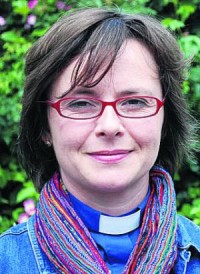 The chair of Women and the Church is not know to many people even within the Church of England, but 2013 will see her become an important figure. With the failure of the Women Bishops’ vote in November, WATCH are now moving towards advocating a single clause measure to deal with the matter once and for all.
The chair of Women and the Church is not know to many people even within the Church of England, but 2013 will see her become an important figure. With the failure of the Women Bishops’ vote in November, WATCH are now moving towards advocating a single clause measure to deal with the matter once and for all.
What the reaction of the establishment will be to this proposal is debatable. Although there is a majority in the Church of England (and very much so in the House of Bishops) to move forward on this issue, the evidence from November is that as provision for traditionalists fades so does support. It’s very likely that the House of Bishops would vote against a single clause, but it should at least be tested in Synod.
So Rachel has a busy year. WATCH will be at the centre of the decisions and activities on this issue and she is likely to take a much more prominent role in the public face of the Church discussions on this issue.
Number 6 – Revd Lee Gatiss
 “Who?” I hear you ask. Why, Lee Gatiss! The former associate minister at St Helen’s Bishopgate has recently been appointed as the new Director of the Church Society, the conservative evangelical think tank and patronage board. In that position he presents a radical departure from previous appointments, where the impression has been, rightly or wrongly, of out of touch and distant elder patriarchs being perpetually in charge.
“Who?” I hear you ask. Why, Lee Gatiss! The former associate minister at St Helen’s Bishopgate has recently been appointed as the new Director of the Church Society, the conservative evangelical think tank and patronage board. In that position he presents a radical departure from previous appointments, where the impression has been, rightly or wrongly, of out of touch and distant elder patriarchs being perpetually in charge.
Lee is a complete contrast to that model. Incredibly internet savvy with a highly-regarded theological website that he has edited for almost a decade, expect to see far more modern styled campaigns like Together4Ward coming out of the Watford base of Church Society. Already it’s clear from actions like the response to the Women Bishop’s vote that a Lee Gatiss led Church Society has learnt from the presentation mistakes of the past few decades and is ready to engage with the wider Church and culture in a manner it will understand.
Number 5 – Very Revd Vivienne Faull
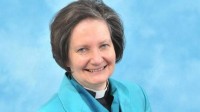 Recently installed as the new Dean of York Minster, Vivienne has reached about as high up the Church of England hierarchy as women can currently manage, now being in charge of one of the prestige churches in the country.
Recently installed as the new Dean of York Minster, Vivienne has reached about as high up the Church of England hierarchy as women can currently manage, now being in charge of one of the prestige churches in the country.
Amongst the women clergy often spoken about for Bishoprics once the stained glass ceiling is removed, Vivienne stands out as a well-loved and highly regarded and appreciated candidate across the theological spectrum (unlike the more divisive figures like June Osborne, Christine Hardman or Judith Maltby) for the highest office. She also has the advantage of being only 57, so still old enough to wear Purple for a good half decade at least assuming the women bishops’ legislation finally gets passed around 2015 / 2016.
She has just been appointed to the new legislative group working with the House of Bishops sorting out the next step forwards on the issue of Women Bishops and that group will have to work fast. This means that 2013 will see not only the public impact of Dean Faull’s work but also the beginning of the fruition of many people’s ambition for her (even if she has none herself) to be the first woman wearing purple in the Church of England.
Number 4 – Sir Joseph Pilling
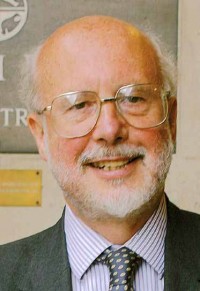 Here’s our first lay member of the list and it’s the chair of the Group on Human Sexuality, set up last February to help the Church of England move forward in this area. Previously Sir Joseph chaired a committee that helped the Church examine how it managed senior appointments, and the general response was that he did a great job even if his proposals were not carried out to their fullest original intent.
Here’s our first lay member of the list and it’s the chair of the Group on Human Sexuality, set up last February to help the Church of England move forward in this area. Previously Sir Joseph chaired a committee that helped the Church examine how it managed senior appointments, and the general response was that he did a great job even if his proposals were not carried out to their fullest original intent.
This time around he’s got his work cut out for him. Whichever way his committee reports it will upset some arm of the Church. If the Report he publishes reaffirms the current conservative position then liberals will be furious. If it presents a case for recognising formally (and perhaps even blessing) same-sex relationships then the conservative wing will be unsheathing swords. He can’t win.
Spare a thought as well for the other members of his group. The Bishop of Gloucester, the Rt Rev Michael Perham, the Bishop of Birkenhead, the Rt Rev Keith Sinclair, the Bishop of Ebbsfleet, the Rt Rev Jonathan Baker and the Bishop of Warwick, the Rt Rev John Stroyan will all have to be put their names to something that, miracles aside, is going to cause division and dissent once it becomes public. God help them and God help us once Sir Joseph has finished his work.
Number 3 – Revd Colin Coward
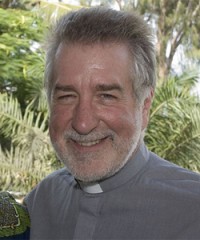 Cometh the hour, cometh the gay activist. With increasing anger in some corners of the Church in response to the Women Bishops’ vote and the Government’s “ban” on the Church of England conducting same-sex marriages, one begins to get the feeling that 2013 will be make or break for the National Director of Changing Attitude.
Cometh the hour, cometh the gay activist. With increasing anger in some corners of the Church in response to the Women Bishops’ vote and the Government’s “ban” on the Church of England conducting same-sex marriages, one begins to get the feeling that 2013 will be make or break for the National Director of Changing Attitude.
It’s been an interesting journey for Colin over the past few decades. It’s no secret that he didn’t get on with Richard Kirker who ran LGCM for a large part of its history. That power struggle eventually led to Colin forming CA in the 1990s as a particularly Anglican pressure group on human sexuality issues. Since then CA has grown in influence and is arguably in 2013 the leading pro-gay group in the Church and the locus around which other groups coalesce. Certainly Colin was part of the team organising liberal GLBT presence at the Lambeth 2008 conference and he can normally be found at General Synod conversing with members. At the same time he’s not short of controversy, most recently over declaring publicly that he was going to have a church service to bless his Civil Partnership and in 2011 inadvertently outing a number of Bishops.
Although he is close to retirement, has he saved the best till last? Given the current furore over same-sex marriage, together with the upcoming release of the report from the group chaired by Sir Joseph Pilling, will 2013 see the culmination of everything he’s been working for the past 30 years as the Church of England finally recognises and affirms same-sex unions, or is he going to draw his pension seeing the Church of England restate the traditional position on human sexuality and gear up to take on the Government?
Either way, 2013 is going to see Colin in the news more and more as issues of human sexuality come to the fore. The next twelve months are his, though in what shape or form and for better or for worse we’ve yet to see.
Number 2 – Rt Revd Justin Welby
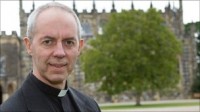 Only number two I hear you ask? Justin will be getting the top job very shortly (and we’ll have to make him a Most Revd in the list at that point) and then the fun will really start for this former oil executive turned reconciliation facilitator turned Archbishop. Certainly he has the personality for the job – there are huge numbers of clergy who would do anything to climb the pole of patronage in the Church of England, but the impression with Welby is that with every call to higher office he was literally throwing around as much grease as possible.
Only number two I hear you ask? Justin will be getting the top job very shortly (and we’ll have to make him a Most Revd in the list at that point) and then the fun will really start for this former oil executive turned reconciliation facilitator turned Archbishop. Certainly he has the personality for the job – there are huge numbers of clergy who would do anything to climb the pole of patronage in the Church of England, but the impression with Welby is that with every call to higher office he was literally throwing around as much grease as possible.
He has a few tough nuts to crack straight away, including how to get through the mess over Women Bishops, but then in the medium term there is the more interesting challenge of renewing and reinvigorating the Church of England’s civil service. Will he maintain the Lambeth Palace / Church House divide that has so dominated internal politics for the past few decades, or will he take the opportunity of a clear mandate (he was by all accounts the preferred candidate of almost the entire CNC) to shake things up a bit and get the ball rolling on reorganisation sooner rather than later? And then there’s that thorny issue as to whether he should make his home in London or Canterbury? I know a great church just round the corner from the Bishop’s Palace in Canterbury with some top-notch attached clergy…
Number 1 – Rt Hon David Cameron,  Prime Minister of the United Kingdom, First Lord of the Treasury, Minister for the Civil Service
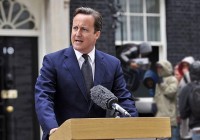 Bless. 2013 is going to be the year that David Cameron really starts to discover how Anglican he is. David Cameron isn’t even on a PCC anywhere but as a confirmed member of the Church of England he will have a greater effect on the Church in 2013 then any other members of this list.
Bless. 2013 is going to be the year that David Cameron really starts to discover how Anglican he is. David Cameron isn’t even on a PCC anywhere but as a confirmed member of the Church of England he will have a greater effect on the Church in 2013 then any other members of this list.
The introduction of gender-neutral marriage is going to set the proverbial cat amongst the pigeons. Already the Church of England is complaining that they weren’t consulted about the “quadruple-lock” that will make it illegal for the Church to conduct same-sex marriages. On top of that some activists from within and without the Church are threatening to challenge that in the courts all the way to the ECHR and the Church’s own press release calls the proposed legislation an “omnishambles”.
There is the outside chance that given the curious way Church of England clergy act as marital registrars, combined with the current legal right for parishioners to be married in their local church, that the conflict will become so profound that disestablishment is the only option for a Church of England that still believes in traditional biblical sexual morality to maintain its ban on same-sex weddings. Alternatively the changes in society that the Prime Minister is introducing may cause the Church of England to reconsider it’s position on this subject (and that’s certainly what Colin Coward, our number three on the list, wants). Either way, as Cameron pushes the legislation through Parliament in 2013 the debate over how it affects the Church of England, both on the immediate issue and also the future relationship between Church and State, will have profound impact upon the Church of England in the years to come.
For that reason David Cameron, the lowliest of all laity, is our number one Anglican who will influence the Church in 2013.
can you really get underwear from Wippell’s? In liturgical colours no doubt!.
Well, they do have the lace for it ;-)
Not in liturgical colours, but I definitely saw a pair when I was flicking through a catalogue at the vicar factory.
male or female?
;)
Male
Of course male – it’s Wippell’s!
I’m still undecided if vicar factory residents flicking through catalogues featuring male underwear is, from a conservative perspective, better or worse than catalogues of female underwear ;-)
Plus, it would be pretty sad, nearly 18 years after female ordination in the C of E, if the grand old vestment houses only supplied male clergy!
Youngest Diocesan being 53 is a little worrying.
Too old or too young?
Deleted.
Not really of very great impact on me as a Christian in South Africa, Peter, but I found it interesting none the less and am aware of some of these future ‘movers and shakers’ through my UK Anglican friends. A couple of thoughts:
1. Is Rev Sally Hitchiner a total babe (in a vaguely Goth/Morticia Addams sort of way) or what? If this is the result of women’s ordination then forget the theology – I’m all for it! More seriously, she sounds majorly talented and I’m glad the dear old fuzzy CofE is now getting some serious quality into its ranks.
2. David Cameron at No.1? I don’t know enough off the UK Anglican scene to agree or disagree with any of the other placings. I think however you greatly over-estimate his importance, Peter. This is ‘Son of Blair’ – the belief and conviction-lite politican who tries to be all things to all people. His whole history shows that his Christian faith is little more than a cultural relic that can be wheeled out at convenient times. I think that he neither cares for the CofE nor understands it – and I don’t think that bothers him very much at all. Gender-neutral marriage (GNM) has become a totem symbol for the ‘modernisation’ of the Tory party and it will be driven through (unless, crucially, it is scuppered by ongoing economic crisis) for that reason – for symbolic purposes by a politican to whom presentation and PR is everything.
So I agree with you that GNM will be the defining issue for the CofE in 2013 – the year it can no longer fudge things. But Cameron’s position on GNM has, and will have, nothing to do with the CofE. His calculations are of public presentation, symbolism and coalition dynamics. So, in that sense, he is of no relevance to the CofE as his positions on GNM are already pre-determined by non-Christian and non-CofE factors.
The way in which GNM impacts the CofE will be determined by the CofE itself – its theology, its ecclesiology, its politics and its people, especially its senior people. And in this respect most of the rest of your ‘Top 10’ are, I suspect, very important indeed!